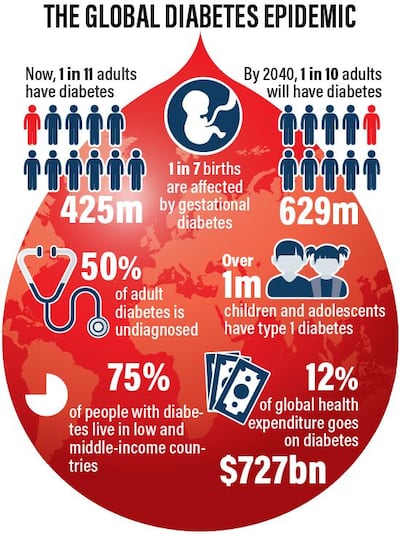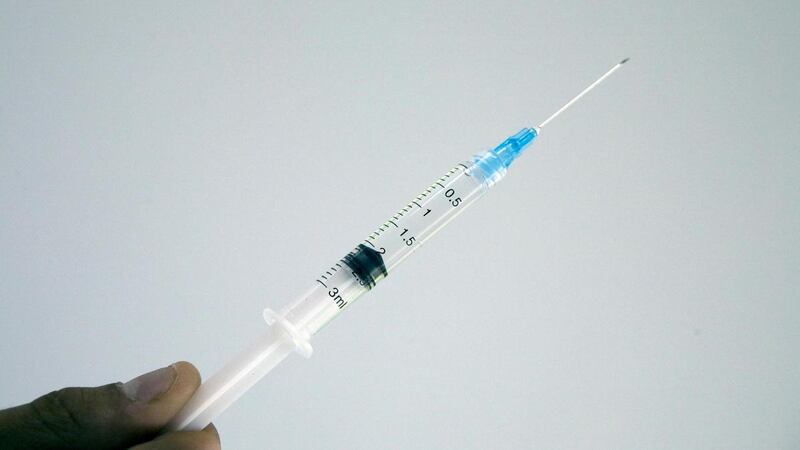Nations need to improve diabetes prevention programmes if they are to avoid a future health crisis, a report by the International Diabetes Federation has warned.
It said that urgent action needs to be taken to curb contributing factors such as childhood obesity to meet targets for the reduction of new cases by 2025.
In 2014, governments around the world committed to attempt to reduce the rise in diabetes to 0 per cent following recommendations by the World Health Organisation.
Four years on and just five countries say they are on track to achieve that, leaving many others heading for a difficult future.
Last year in the Middle East and North Africa alone, US$21.3 billion was spent treating the 38.7 million people with diabetes.
In the UAE, over a million people have diabetes, with many more likely to be either undiagnosed or pre-diabetic — a condition that leaves many on the edge of the chronic disease.
Figures from 2015 show that 19.3 per cent of the population have the condition, positioning it 13th on a World Diabetes Federation list.
Last year, the UAE spent an average of Dh8,334 treating each diabetic patient and there were 2,160 related deaths.

It is a major killer across the region — in 2017, 71,293 people lost their lives to the condition in Egypt, and there were 14,665 related deaths in Saudi Arabia.
In Lebanon, diabetes was a factor in 5,530 early deaths and it was also blamed for 2,838 deaths in Jordan and 1,219 in Kuwait.
“Halting the rise of diabetes will require a paradigm shift from personal to shared responsibility, with greater accountability from governments and the food industry,” said Dr Yasser Sadawey from Medeor 24x7 International Hospital, Al Ain.
“Governments should try something different to encourage greater education and the provision of information.
“Regulations could strengthen public response by implementing front-of-pack food labelling and curb junk food advertising.”
Steps have already been taken in Abu Dhabi to encourage personal responsibility for healthcare to encourage healthier living choices in an attempt to stem the spread of the disease.
The Weqaya screening programme gives people a personal health report, explaining the results to them and advising on how to avoid certain health conditions.
A sugar tax on fizzy drinks as well as mandatory exercise in primary schools to help fight obesity levels have also been implemented to improve the nation’s health.
“The UAE's diabetes associations and healthcare organisations are doing a commendable job of educating the masses, but more needs to be done based on the speed at which this condition is growing,” said Dr Sarla Kumari of Canadian Specialist Hospital.
“Often, people do not know they have diabetes. When left untreated, it can lead to complications like blindness, kidney damage, diabetic foot and cardiovascular disorders.
“Lack of exercise, high calorie foods and genetic factors are making GCC communities highly predisposed to diabetes, but the gravity of the threat has yet to be recognised.”
__________________
Read more:
UAE medics frustrated as some patients treat wheelchairs like 'brand new cars'
Should governments force businesses to disclose calorie information?
Exercise could delay onset of Type 1 diabetes, study finds
___________________
Research from the IDF has found 17 per cent of people living in the UK, US, Brazil, Turkey, China, India and South Africa did not think governments there were doing enough to combat the spread of diabetes.
They have called on governments and health authorities to focus more on their prevention programmes and boost investment to give 80 per cent of people access to essential medicines and devices by 2025.
It suggests that offering universal health coverage would also help treat the disease, making medicines such as insulin affordable and accessible.
And more education, the IDF says, would help reduce diabetes-related premature deaths by 30 per cent.
“The most important and effective way to educate the public on how they can reduce their diabetes risk is lifestyle modification,” said Dr Dinesh Kumar Dhanwal, an endocrinologist at NMC Hospital, Abu Dhabi, echoing the advice of other doctors.
In September 2017, medical journal The Lancet published an in-depth analysis of the progress that countries have made in combating the disease by evaluating childhood obesity, universal health coverage and non-communicable disease mortality.
The UAE ranks 121 in the world overall and, on a scale of 0-100 with 100 representing the best performing nations, it scores 39 for childhood obesity, 67 for access to healthcare and 52 for non-communicable disease mortality.
“In newly diagnosed cases of diabetes it is possible to reverse the condition by changing someone’s lifestyle, adding exercise and replacing simple carbohydrates with salad, vegetables and fruits,” Dr Dhanwal said.
“I have a good number of patients who, after initial treatment with oral agents or even insulin, are now off medication after making these changes.”
Globally, the IDF reported 425 million adults were living with the disease last year.
“The cost of diabetes is significant to individuals and society,” said Professor Nam H Cho, President of the International Diabetes Federation.
“Governments must do more and now is the time for them to take responsibility and be accountable.”







